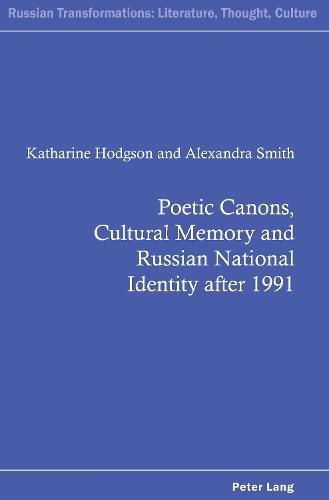Readings Newsletter
Become a Readings Member to make your shopping experience even easier.
Sign in or sign up for free!
You’re not far away from qualifying for FREE standard shipping within Australia
You’ve qualified for FREE standard shipping within Australia
The cart is loading…






This title is printed to order. This book may have been self-published. If so, we cannot guarantee the quality of the content. In the main most books will have gone through the editing process however some may not. We therefore suggest that you be aware of this before ordering this book. If in doubt check either the author or publisher’s details as we are unable to accept any returns unless they are faulty. Please contact us if you have any questions.
The collapse of the Soviet Union forced Russia to engage in a process of nation building. This involved a reassessment of the past, both historical and cultural, and how it should be remembered. The publication of previously barely known underground and emigre literary works presented an opportunity to reappraise official Soviet literature and re-evaluate twentieth-century Russian literature as a whole.
This book explores changes to the poetry canon - an instrument for maintaining individual and collective memory - to show how cultural memory has informed the evolution of post-Soviet Russian identity. It examines how concerns over identity are shaping the canon, and in which directions, and analyses the interrelationship between national identity (whether ethnic, imperial, or civic) and attempts to revise the canon. This study situates the discussion of national identity within the cultural field and in the context of canon formation as a complex expression of aesthetic, political, and institutional factors. It encompasses a period of far-reaching upheaval in Russia and reveals the tension between a desire for change and a longing for stability that was expressed by attempts to reshape the literary canon and, by doing so, to create a new twentieth-century past and the foundations of a new identity for the nation.
$9.00 standard shipping within Australia
FREE standard shipping within Australia for orders over $100.00
Express & International shipping calculated at checkout
This title is printed to order. This book may have been self-published. If so, we cannot guarantee the quality of the content. In the main most books will have gone through the editing process however some may not. We therefore suggest that you be aware of this before ordering this book. If in doubt check either the author or publisher’s details as we are unable to accept any returns unless they are faulty. Please contact us if you have any questions.
The collapse of the Soviet Union forced Russia to engage in a process of nation building. This involved a reassessment of the past, both historical and cultural, and how it should be remembered. The publication of previously barely known underground and emigre literary works presented an opportunity to reappraise official Soviet literature and re-evaluate twentieth-century Russian literature as a whole.
This book explores changes to the poetry canon - an instrument for maintaining individual and collective memory - to show how cultural memory has informed the evolution of post-Soviet Russian identity. It examines how concerns over identity are shaping the canon, and in which directions, and analyses the interrelationship between national identity (whether ethnic, imperial, or civic) and attempts to revise the canon. This study situates the discussion of national identity within the cultural field and in the context of canon formation as a complex expression of aesthetic, political, and institutional factors. It encompasses a period of far-reaching upheaval in Russia and reveals the tension between a desire for change and a longing for stability that was expressed by attempts to reshape the literary canon and, by doing so, to create a new twentieth-century past and the foundations of a new identity for the nation.